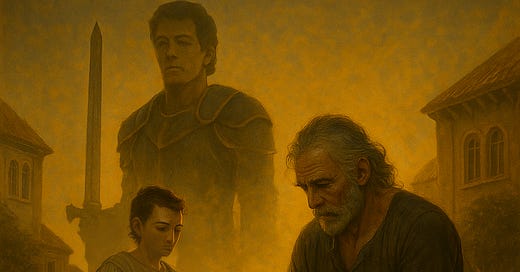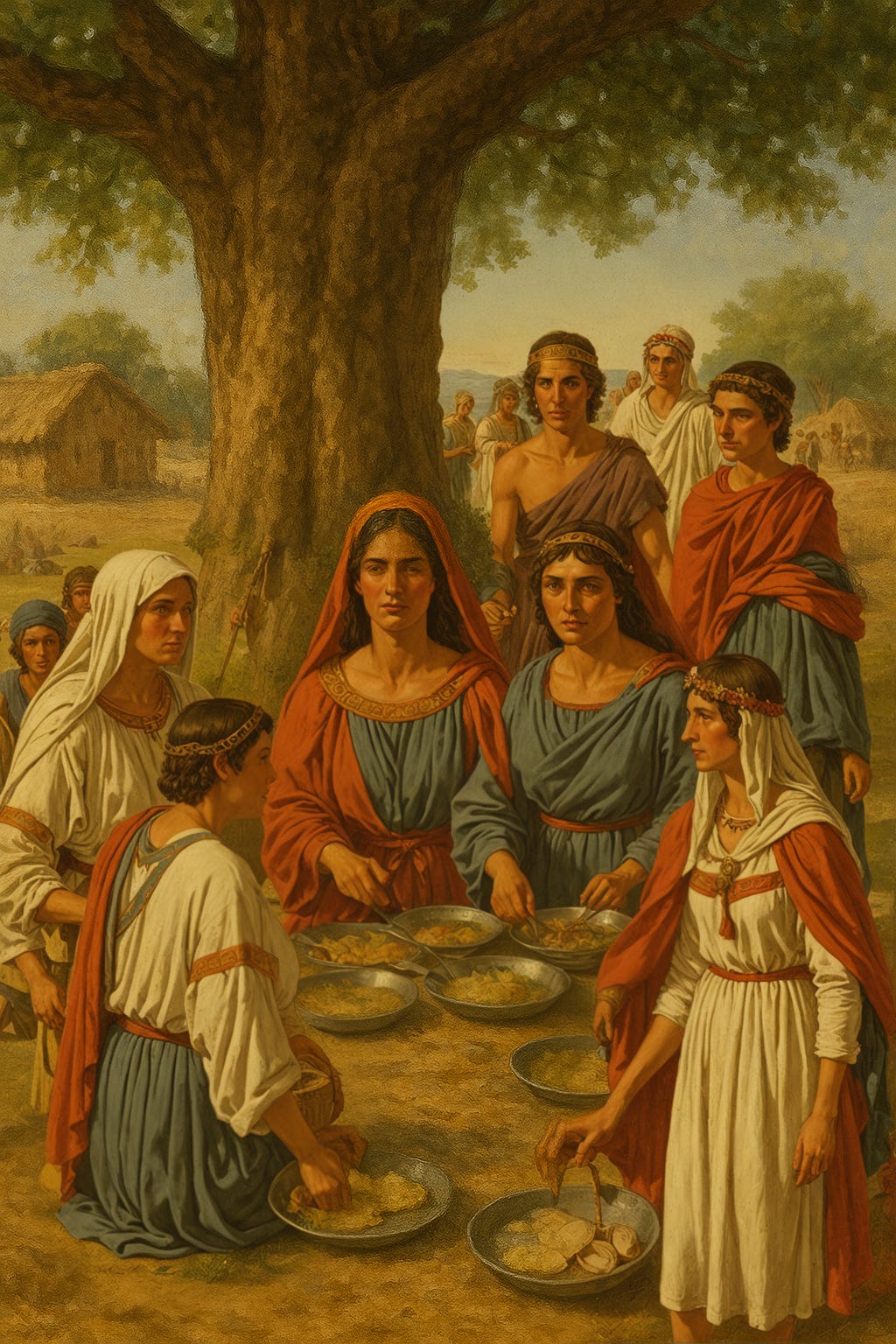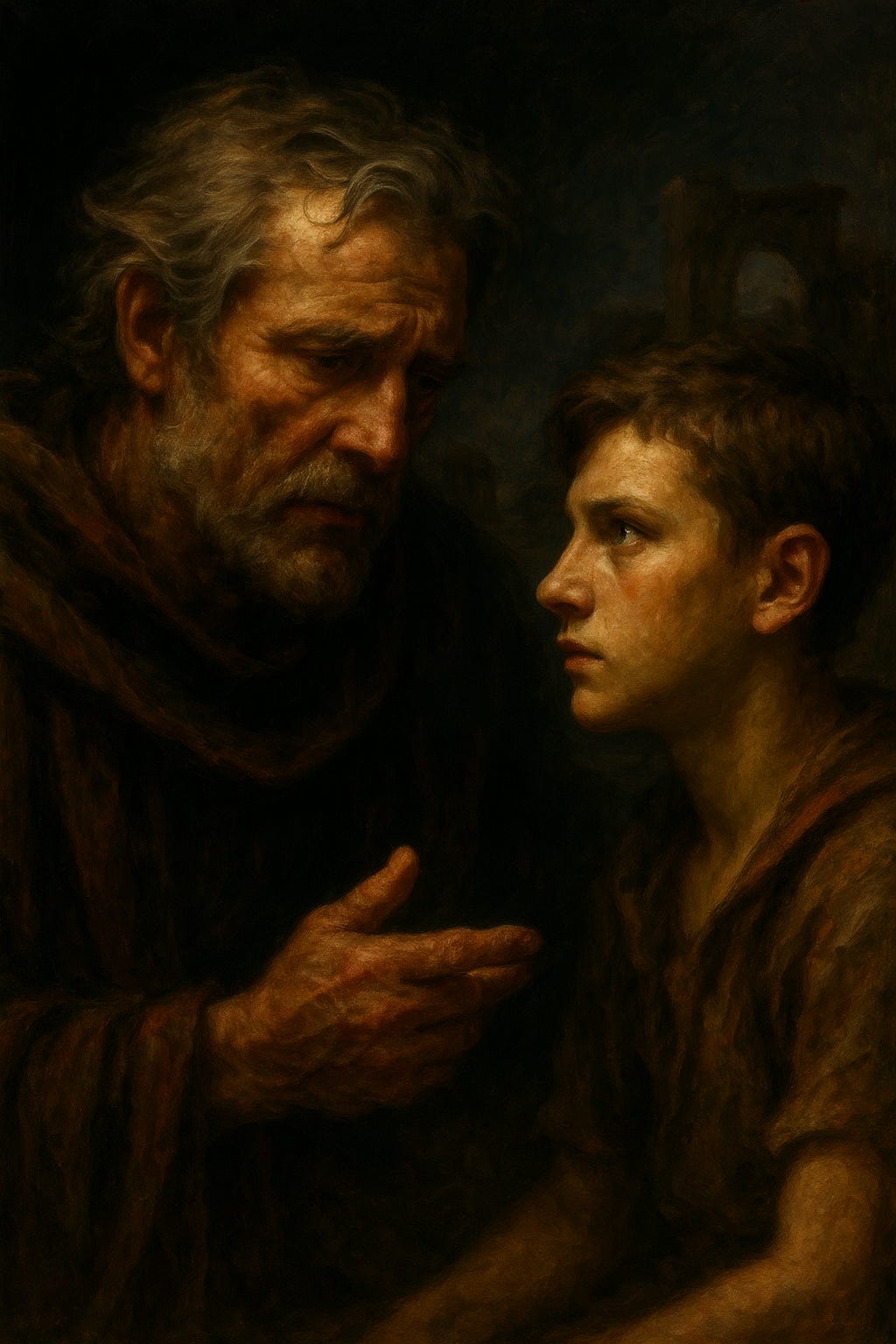A story forgotten in history.…
In the vast kingdom of Elderwyn, there lay a small village on its border—neglected by rains and forgotten by rulers. Hunger was a constant enemy, a shadow that clung to every doorstep. But the villagers had one unwavering friend: unity. Together, they stood strong, sharing joys in the thick of hardship and laughter even in the face of pain. They never waited for a savior; they believed in saving each other.
Among them lived Elandor, a farmer’s son. Admired by all, respected by many, he worked harder than most and shared more than he kept. Whatever he harvested beyond his needs, he gave to the village godown—no pride, only purpose. He treated everyone as family.
Then one day, the government officials—who had never once stepped foot in the village—arrived with a cruel demand. The king wished to construct a grand monument as a symbol of his glory. To fund it, extra taxes were imposed on already starving villagers.
The people refused. Their lives were already burdened. But the officials, eager to impress the king, unleashed violence and chaos. The village that once sang together now cried in fear. Their homeland suffered—crushed under an empire that stripped it of dignity.
Elandor couldn’t bear the atrocities. The king was too distant to hear their cries, and time had run out. He rose in rebellion.
Labeled a terrorist by the state, but hailed a freedom fighter by the people, Elandor became their voice. He was fire and steel, purpose and poetry. With every speech, he awakened courage. With every battle, he bled belief into his people.
His intentions were pure. He led by example and never left anyone behind. He taught them to fight—not with hatred, but with hope. Soon, he became a symbol of resistance, an emotion across villages. Small kingdoms rallied behind him. He fought for justice, for the voiceless, for the dream of a life without fear.
And finally, the tyrant king fell. The palace burned, and the people crowned Elandor their savior.
Was that the end of the story?
No. It was only the beginning.
The war had ended. The enemy was vanquished. The people danced in the streets. Slogans echoed through the valleys, all carrying one name: Elandor.
But wars, like storms, pass. And peace, unlike war, is quiet—uncomfortably quiet. Because peace has no enemy. And without an enemy, who was Elandor?
He now sat in high councils, wore silk instead of armor, issued decrees instead of battle cries. He held power, but peace exhausted him. His dream of a free and dignified world existed only in his imagination.
He was now solving petty crimes and disputes over land. There was no glory in it. Frustrated, he began to wonder: was freeing the people even worth it?
To fill the void, he tried to revive the struggle. He created new enemies—corruption, inefficiency, disloyalty. He suspected betrayal where none existed. He turned on old allies. Without war, he was losing himself.
People, too, had changed. They forgot his sacrifices. When food prices rose and crops failed, they blamed him. At first, he listened. Later, he silenced them.
“You owe me your freedom,” he declared.
“You forget who I was.”
He commissioned monuments to remind people of his glory. Power had turned him bitter. He had become the very tyrant he once fought against.
Whispers of rebellion started again—in taverns, temples, and quiet corners.
But one voice spoke not in whispers, but in clarity.
A boy named Auren.
Born the year Elandor had won the war, Auren had grown up listening to tales of the great hero. He revered Elandor—not the ruler, but the revolutionary. But now, Auren saw a hero who had overstayed his place on the stage.
He wasn’t angry, just saddened… and resolute. He began to speak Elandor’s old words. He rallied people with the fire that once belonged to Elandor himself.
Elandor heard those speeches. A chord struck within. He summoned the boy to his palace.
“Why this unrest?” he asked.
Auren replied, steady and sincere, “You led us when we were blind. But now… you’re creating shadows where there’s light. The people need peace, not your paranoia.”
Elandor scoffed. “Peace is a lullaby for fools. We’re becoming weak. Soft. Unworthy of the blood we spilled.”
“And in trying to keep the fight alive,” Auren said, “you’ve become the tyrant we once overthrew.”
A long silence. Elandor’s eyes narrowed—not in anger, but in understanding. He realized, in that moment, what he had become.
“Perhaps,” he whispered, “heroes must die after war. Not for the world’s sake… but for their own.”
That night, Elandor disappeared. Some say he walked into the mountains alone. Others whisper that he asked Auren to end it for him.
Before leaving, he laughed aloud...then he whispered in Auren's ear:
Listen carefully. The world doesn’t want heroes. They want slaves they can elect to serve them—and hold the power to replace them.”... he laughed and laughed yelling "slaves....slaves...."
Peace returned—not perfect, but enough.
In the square where the revolution began, there now stands a statue. Not of Elandor holding a sword, but of Elandor laying it down.
Beneath it is a single inscription:
"Let not the fire that saved us become the flame that burns us."
Core Pattern:
The cause united them.
The victory isolated them.
The struggle gave them identity.
The peace exposed their flaws.
Dear gentle readers,
Would you like to build on this?
Perhaps a sequel where Auren mentors the next generation—not to fight, but to preserve peace with wisdom?
Relevant Posts:-
The Invisible Crown
Once upon a time, in a quiet little village, something magical happened. God appeared before the people, blessing each with what they desired the most. Some wished for gold, others for wisdom, and yet others for love.















The cause united them.
The victory isolated them.
The struggle gave them identity.
The peace exposed their flaws
Powerful words, these are applicable in real life also. Many rulers once a rebellion and robinhood for the suffering people.
Wow. I don’t normal choose this type of story, but this is so engaging and well done! Thank you!